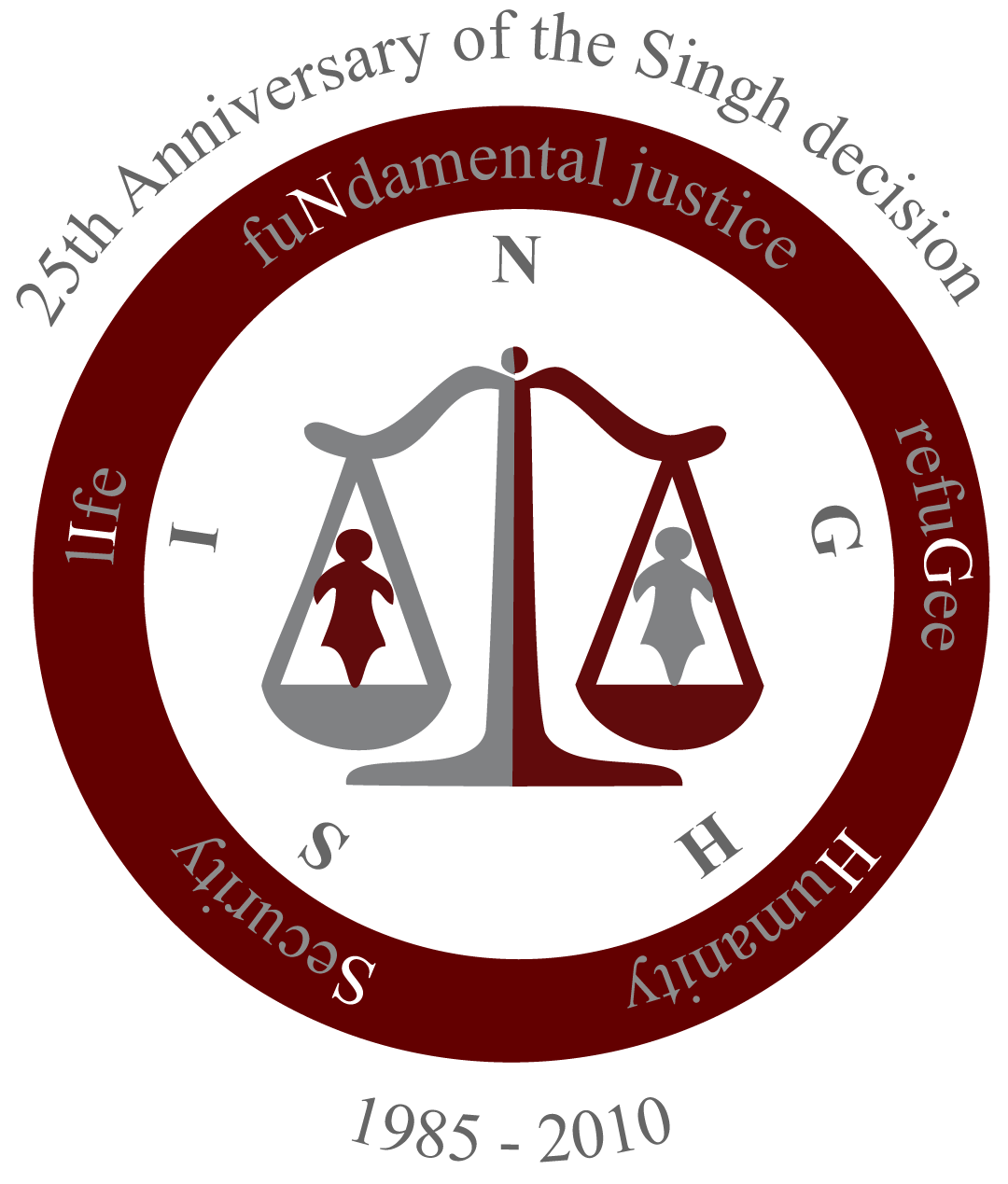***
CONTENTS:
- Proposed Refugee Reform Undermines Fairness to Refugees
- Barriers to Family Reunification for Haitians
- Cairo Visa Office: Refugees denied a fair hearing – new CCR report
- Refugee Rights Day – Guaranteeing Life, Liberty, Security and Humanity for Refugees in Canada for 25 years: Take action, Find out what’s happening near you
- Update on Processing at the Nairobi Visa Office
- Register now!: CCR Spring Consultation ‘Solidarity and Protection: Our obligations at home and abroad’ 3-5 June 2010, Ottawa
- Faces of the CCR: Yaya de Andrade and Carolina Gajardo
- New from the CCR
-
- Transportation Loans: Petition to Parliament
- Resources for Refugee Rights Day, 4 April 2010
-----
On March 30th, the CCR raised some serious concerns with certain aspects of the refugee reform announced by the government.
“The introduction of a list of “safe countries of origin” is a mistake,” said Wanda Yamamoto, CCR President. “The refugee system needs to give everyone a fair hearing, based on the facts of their individual case. Instead the government is proposing a two-tier system, which denies some claimants access to the appeal based on nationality.”
The CCR is concerned that claimants that will be particularly hurt include women making gender-based claims, and persons claiming on the basis of sexual orientation or sexual identity. In many countries that otherwise seem fairly peaceful and “safe”, there can be serious problems of persecution on these grounds. Yet, these claimants will not get access to an appeal, as would other claimants.
The CCR also considers it a mistake to turn first-instance decision making over to civil servants, because they lack the necessary independence. Canada has become a model for countries around the world with its current system of initial refugee decisions made by a fully independent board member – this important asset would be lost under the government’s proposal. Systems using civil servants in other countries have proved unsuccessful, with a large number of cases overturned on appeal.
Another concern is the proposal to have hearings within two months of the making of the claim. While many refugees will welcome an early hearing, for some it will represent a serious disadvantage, notably refugees who have experienced serious trauma such as torture, refugees who cannot have the relevant documentation sent to Canada quickly enough and refugees who need to build trust in order to be able to testify freely (such as women and persons claiming on the basis of sexual orientation who have experienced sexual assault).
For a copy of the CCR’s press release with more information about the CCR concerns, see: http://ccrweb.ca/en/bulletin/10/03/30
For a copy of the legislation, see: http://www2.parl.gc.ca/HousePublications/Publication.aspx?Docid=4393137&file=4
For media articles on the Minister’s announcements and possible reforms to Canada’s refugee determination system, see: http://ccrweb.ca/en/mediarefugeereform
The CCR and the TCRI issued a press release criticizing the Canadian immigration response to the earthquake in Haiti for its failure to meet the urgent needs for family reunification.
More than two months after the earthquake, the federal government has issued very few visas to allow Haitians in distress to reunite with family in Canada. Even in cases of children separated from both parents, and living in the streets since the earthquake, Citizenship and Immigration Canada is issuing few or no temporary permits to ensure immediate reunification. While waiting, some of these children are not getting enough to eat and girls are at risk of sexual assault, a widespread problem at this time. The 13-year-old daughter and 12-year-old son of Éline François have been in the street since the earthquake. Ms François, a recognized refugee in Canada, had filed her application for family reunification in 2009. She hoped that the children could come on a temporary permit so that they could be safe in Canada during the processing of their file. Recently the Embassy in Port-au-Prince refused their request for temporary admission.
The 13-year-old daughter and 12-year-old son of Éline François have been in the street since the earthquake. Ms François, a recognized refugee in Canada, had filed her application for family reunification in 2009. She hoped that the children could come on a temporary permit so that they could be safe in Canada during the processing of their file. Recently the Embassy in Port-au-Prince refused their request for temporary admission.
Other concerns include:
- Numerous Haitians have been in Canada without permanent status for many years. Without permanent residence, they have no access to family reunification and nothing is being proposed to solve this situation in a timely way.
- The special program put in place by the Government of Quebec is proving ill-adapted to the realities of Quebecers of Haitian origin. In the vast majority of cases they are unable to meet the eligibility criteria, particularly because of the high financial requirements.
- CIC’s communications on expediting family reunification applications exclude refugees, despite repeated requests to correct this error. Their communications speak only of Family Class sponsorships, while refugee family reunification does not involve sponsorship.
See the CCR recommendations, http://ccrweb.ca/en/immigration-measures-haiti
For more information:
Quebec special measures (in French): http://www.immigration-quebec.gouv.qc.ca/fr/informations/haiti-parrainage/formulaires/index.html
The Canadian Council for Refugees released a report in late March, Concerns with refugee decision-making at Cairo, on decisions on refugee applications made at one of Canada’s overseas visa offices. The report reveals serious problems with decision-making, including lack of basic knowledge of realities in the refugees’ country of origin, basic errors in applying the refugee definition, and multiple flaws in credibility assessments.
The CCR has longstanding concerns about the quality of refugee decision-making at visa offices overseas. While the report focuses on decisions at one particular visa office, the CCR believes it reflects systemic shortcomings. Visa officers are often inadequately trained, decisions are rarely reviewed by the courts or monitored internally, and there are few witnesses to interviews, which are not recorded. The system thus lacks accountability.
The report provides an analysis of 17 cases, all Eritrean refugee applicants rejected at Canada’s visa office in Cairo since September 2009. The CCR has since received information about further rejected cases showing similar problems. They include Iraqi and Zimbabwean applicants. Many of the rejected applicants have been recognized as refugees by the UN Refugee Agency.
The CCR submitted its report to Citizenship and Immigration Canada in early February, but has so far received no substantive response.
For the complete release, see http://ccrweb.ca/en/bulletin/10/03/25
For the complete report, see: http://ccrweb.ca/sites/ccrweb.ca/files/CairoConcerns.pdf
- Refugee Rights Day – Guaranteeing Life, Liberty, Security and Humanity for Refugees in Canada for 25 years: Take action, Find out what’s happening near you
 This April 4th reach out to your community about refugee rights. You’ll find all you need to speak out about refugee rights this Refugee Rights Day on the CCR website. This includes suggestions and materials to alert the Canadian public, members of the media and politicians to advances made in the protection of refugee rights as a result of the Singh decision, as well as to threats to those rights.
This April 4th reach out to your community about refugee rights. You’ll find all you need to speak out about refugee rights this Refugee Rights Day on the CCR website. This includes suggestions and materials to alert the Canadian public, members of the media and politicians to advances made in the protection of refugee rights as a result of the Singh decision, as well as to threats to those rights.
April 4th 2010 marks the 25th anniversary of the Supreme Court’s 1985 Singh decision. In this decision the Supreme Court found that the Canadian Charter of Rights and Freedoms protects the fundamental rights of refugees. The Court decided that ‘everyone’ includes refugee claimants in the sentence: ‘Everyone has the right to life, liberty and security of the person and the right not to be deprived thereof except in accordance with the principles of fundamental justice.’
See the brochure on Refugee Rights Day on what the Singh decision means for refugees in Canada.
To learn more about the 1985 Singh decision, check out this video with Barbara Jackman, one of the lawyers who argued the case in 1985: http://www.youtube.com/watch?v=RTopp_ixMXU
Take action this Refugee Rights Day - for ideas of what you can do, see: http://www.ccrweb.ca/rrd and share these ideas with others.
For Refugee Rights Day actions and resources to use see: http://www.ccrweb.ca/RRDayresources.htm
For some short videos about the Singh decision and Refugee Rights Day events and activities happening near you, see: http://www.ccrweb.ca/RRDevents.htm
Join us on Facebook or check out Refugee Rights Day videos on YouTube!
Citizenship and Immigration Canada has responded to the CCR’s concerns over excessively long delays at the Nairobi visa office. They have announced plans to transfer some resources to Nairobi in summer 2010. They also report that the visa office has undertaken some organizational changes to increase efficiencies and that proposals are under review to have CIC offices in Canada play a role in initial processing of privately sponsored refugees and refugee family reunification cases.
For the full text of the CIC response, see: http://ccrweb.ca/sites/ccrweb.ca/files/nairobiCICresponsemarch2010.pdf
CIC was responding to the CCR’s recent report: Nairobi: Protection Delayed, Protection denied, http://www.ccrweb.ca/documents/Nairobireport.pdf
Since the report was issued, the statistics published on the CIC website show that the already long processing times for refugee family reunification have grown longer. For the period ending June 30, 2009, 50% of dependants of refugees processed at Nairobi were finalized in 23 months. That has increased to 27 months (for periods ending September 30 and December 31).
The CCR welcomes the CIC response, but will be seeking clarification from CIC about the measures promised. The CCR would also like an assurance that they will result in processing times in Nairobi being in line with other visa offices, in the interests of fairness for all. The CCR invites you to join in calling on the government to ensure effective solutions are implemented.
The CCR has prepared a suggested outline of a letter to write to the Minister. You are encouraged to highlight a case delayed at Nairobi to illustrate the concrete human impacts – either one known to you or one proposed by the CCR.
For more information and model letter, see http://ccrweb.ca/en/nairobi-protection-delayed-action
For an in-depth look at the human impacts that delays in processing are having on families, see:
‘Une famille congolaise réunie au Canada après 5 ans d’attente’, La Presse, 17 March 2010 (in French) : http://www.ccrweb.ca/en/une-famille-congolaise-reunie-au-canada-apres-5-ans-dattente
- Register now!: CCR Spring Consultation ‘Solidarity and Protection: Our obligations at home and abroad’ 3-5 June 2010, Ottawa
 From 3-5 June 2010, refugee and immigrant rights advocates from across Canada will be gathering in Ottawa for the Canadian Council for Refugees 2010 (CCR) Spring Consultation on the theme Solidarity and Protection: Our obligations at home and abroad.
From 3-5 June 2010, refugee and immigrant rights advocates from across Canada will be gathering in Ottawa for the Canadian Council for Refugees 2010 (CCR) Spring Consultation on the theme Solidarity and Protection: Our obligations at home and abroad.
Discussions will address issues that challenge refugees, immigrants, advocates and community workers.
Information about the Consultation and online registration forms are available at: http://www.ccrweb.ca/meetings Register before 14 May for reduced fees!
Limited funding to subsidize youth and participants from the settlement sector is available. Apply by 21 April 2010. Information and applications are available on the CCR meetings page.

The establishment of north-south collegiality and solidarity, “a global network of expertise exchange,” and developing practices for unique scenarios were some of the successes of the workshop. “You cannot go to another cultural context and bring something ready done from a different perspective. We invited participants to dialogue and determine what is the best result from what we know and from the experience of everyone, which is far more enriching,” says Yaya. Both Yaya and Carolina emphasized the importance of the process of self-realization and recognition as key to the training workshop in a north-south context.
As for the unique experience of settlement in Brazil, “we joke that in Brazil everything you throw in the floor will grow, life is more possible, abundant, and very positive.” Both Yaya and Carolina observed that despite a lack of funds, in Brazil there is great creativity and flexible use of resources. “Our Brazilian colleagues do miracles with very little,” says Carolina. In Brazil, civil society is closely involved in resettlement programs, from which we can learn here in Canada. Carolina stresses that we cannot allow detachment between civil society and settlement, nor between professional experts and the people they work with.
Furthermore, in Brazil, most of the settlement workers are members of communities of faith. How to work with different faith communities was discussed at great length, especially now that Brazil has accepted a new group of refugees coming from Muslim regions. Yaya noted that in Canada there is incredible promotion of adjustment for different ethnicities, yet in Brazil there is not a similar system of well-adjusted newcomers helping others from similar backgrounds.
The CCR backing of the workshop was critical for its success. Both Carolina and Yaya emphasize the importance of an institution such as the CCR for obtaining funding, as well as providing credibility for international exchange programs. “The CCR is in the best position to provide the training, individuals in other countries are eager to learn,” says Yaya. “The CCR provides great leadership and vision. Capacity and the expertise acquired during these years must be shared with others as well as others sharing with us,” agrees Carolina. Both have maintained contact with participants in Brazil, and hope to continue follow-up to be sure that what was learned is put into practice, and to continue to maintain and develop global networks which can work towards changing the status quo of settlement programs in Canada and Brazil.
Carolina and Yaya used their experience in Brazil to develop a Facilitator Guide involved in twinning projects. You can find it at http://www.ccrweb.ca/documents/twinningguide.pdf.
- Transportation Loans: Petition to Parliament
 A new tool to add to your campaign efforts! Collect signatures from campaign supporters in your riding and present them to your local Member of Parliament. Ask him or her to table the collected signatures in the House of Commons in support of efforts to have the Canadian government absorb the cost of transportation loans for refugees.
A new tool to add to your campaign efforts! Collect signatures from campaign supporters in your riding and present them to your local Member of Parliament. Ask him or her to table the collected signatures in the House of Commons in support of efforts to have the Canadian government absorb the cost of transportation loans for refugees.
Download a copy of the petition at: http://ccrweb.ca/en/petition-transportation-loans-refugees
For more information about the campaign on refugee transportation loans and additional campaign resources, see: http://www.ccrweb.ca/transportationloans.htm
- Resources for Refugee Rights Day, 4 April 2010
 Check out the resources on the CCR’s dedicated Refugee Rights Day webpage to take action: www.ccrweb.ca/RRDay.htm. We encourage you to use these resources in preparation for and during activities marking Refugee Rights Day on April 4th. This year marks the 25th anniversary of the Supreme Court’s 1985 Singh decision.
Check out the resources on the CCR’s dedicated Refugee Rights Day webpage to take action: www.ccrweb.ca/RRDay.htm. We encourage you to use these resources in preparation for and during activities marking Refugee Rights Day on April 4th. This year marks the 25th anniversary of the Supreme Court’s 1985 Singh decision.
As part of Refugee Rights Day activities this year, we have produced short video clips on why the Singh decision is important and on the difference it has made in the lies of several people. Contribute your own video and share them with others on this 25th anniversary of the Singh decision: What does it mean to you and others in your life? Check the CCR’s YouTube channel at: http://www.youtube.com/ccrwebvideos and let us know how we can add yours to the collection.
Are you planning an activity on or around April 4th? Let us know and we can pass the word on through the CCR website. Send an email to Colleen French at cfrench@ccrweb.ca with the details.
Looking for other ways to stay in touch with the CCR and refugee and immigration issues? Subscribe to receive updates from the CCR on Twitter and Facebook:
To join the CCR on Facebook: http://bit.ly/5UWGFw
To follow the CCR on Twitter: http://twitter.com/ccrweb
To view CCR videos on YouTube: http://www.youtube.com/ccrwebvideos
